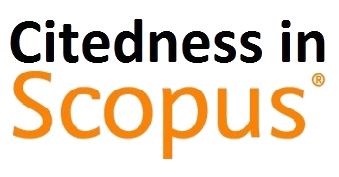Comparison of the Multinomial Naive Bayes Algorithm and Decision Tree with the Application of AdaBoost in Sentiment Analysis Reviews PeduliLindungi Application
(1) Universitas Siliwangi Tasikmalaya, Indonesia
(2) Universitas Siliwangi Tasikmalaya, Indonesia
(3) Universitas Siliwangi Tasikmalaya, Indonesia
(*) Corresponding Author
Abstract
Full Text:
PdfReferences
D. Sharma, M. Sabharwal, V. Goyal, and M. Vij, “Sentiment analysis techniques for social media data: A review”, Springer Singapore., vol. 1045, (2020).
W. Medhat, A. Hassan, and H. Korashy, “entiment analysis algorithms and applications: A survey,” Ain Shams Eng. J., vol. 5, no. 4, (2014) , pp. 1093–1113.
B. Liu, “Sentiment analysis: Mining opinions, sentiments, and emotions”, (2015).
M. T. H. Bunga, B. S, Djahi, and Y. Y. Nabuasa, “Multinomial Naive Bayes Untuk Klasifikasi Status Kredit Mitra Binaan Di PT . Angkasa Pura I Program Kemitraan”, J-Icon., vol. 6, no. 2, pp. 30–34, (2018), pp. 30–34.
S. Rizkia, E. Budi Setiawan, and D. Puspandari, “Analisis Sentimen Kepuasan Pelanggan Terhadap Internet Provider Indihome di Twitter Menggunakan Metode Decision Tree dan Pembobotan TF-IDF”, e-Proceeding Eng., vol. 6, no. 2, (2019), pp. 9683–9693.
E. K. Adhitya, R. Satria, and H. Subagyo, “Komparasi Metode Machine Learning dan Metode Non Machine Learning untuk Estimasi Usaha Perangkat Lunak”, IlmuKomputer.com J. Softw. Eng., vol. 1, no. 2, (2015), pp. 109–113.
A. Salma and W. Silfianti, “Sentiment Analysis of User Reviews on COVID-19 Information Applications Using Naive Bayes Classifier, Support Vector Machine, and K-Nearest Neighbor”, Int. Res. J. Adv. Eng. Sci., (2021).
M. B. Hamzah, “Classification of Movie Review Sentiment Analysis Using Chi-Square and Multinomial Naïve Bayes with Adaptive Boosting”, J. Adv. Inf. Syst. Technol., vol. 3, no. 1, (2021), pp. 67–74.
L. Dini, U. Sekolah, T. M. Informatika, D. Komputer, N. Mandiri, and R. S. Wahono, “Integrasi Metode Information Gain Untuk Seleksi Fitur dan Adaboost Untuk Mengurangi Bias Pada Analisis Sentimen Review Restoran Menggunakan Algoritma Naïve Bayes”, J. Intell. Syst., vol. 1, no. 2, (2015) , pp. 120–126.
N. S. Wardani, A. Prahutama, and P. Kartikasari, “Analisis Sentimen Pemindahan Ibu Kota Negara Dengan Klasifikasi Naïve Bayes Untuk Model Bernoulli Dan Multinomial”, J. Gaussian, vol. 9, no. 3, (2020), pp. 237–246.
M. Syarifuddin, “Analisis Sentimen Opini Publik Terhadap Efek PSBB Pada Twitter Dengan Algoritma Decision Tree-KNN-Naive Bayes”, Inti Nusa Mandiri., vol. 15, no. 1, (2020), pp. 87–94.
A. R. Zaidah, “Analisis sentiment berbasis aspek pada aplikasi pedulilindungi menggunakan latent dirichlet allocation dan support vector machine”, UIN Sunan Ampel Surabaya., (2021).
A. Mustopa, Hermanto, Anna, E. B. Pratama, A. Hendini, and D. Risdiansyah, “Analysis of user reviews for the pedulilindungi application on google play using the support vector machine and naive bayes algorithm based on particle swarm optimization”, 5th Int. Conf. Informatics Comput. ICIC, (2020),.
F. Illia, M. P. Eugenia, and S. A. Rutba, “Sentiment Analysis on PeduliLindungi Application Using TextBlob and VADER Library”, Proc. Int. Conf. Data Sci. Off. Stat., vol. 2021, no. 1, (2021) , pp. 278–288.
DOI: https://doi.org/10.30645/ijistech.v6i4.257
Refbacks
- There are currently no refbacks.
Jumlah Kunjungan:
Published Papers Indexed/Abstracted By:












